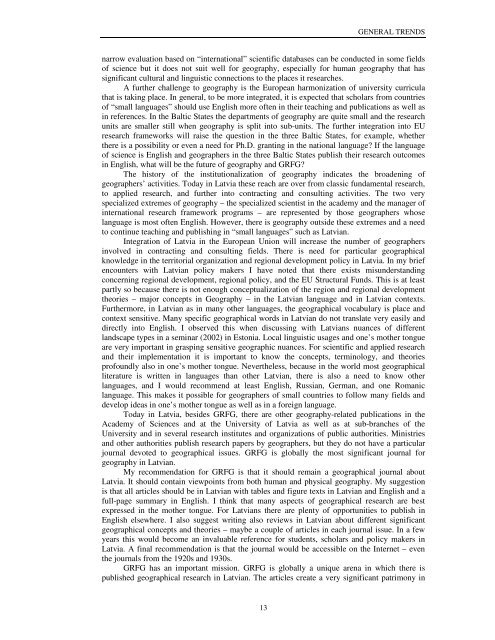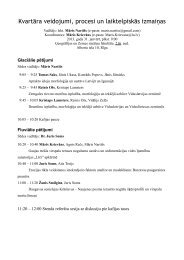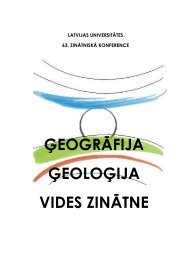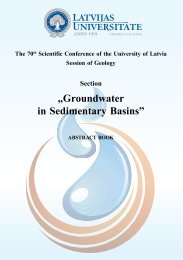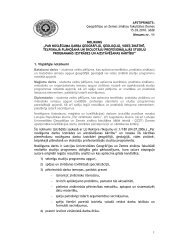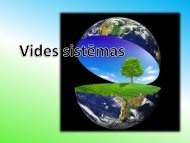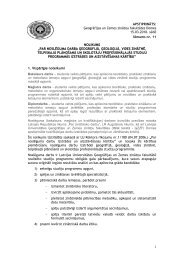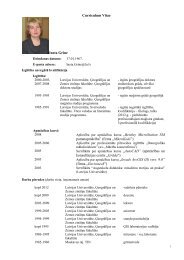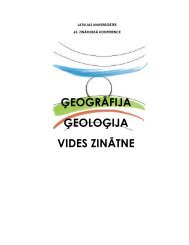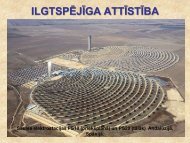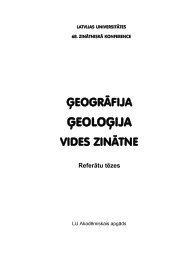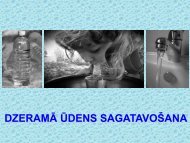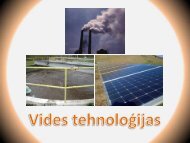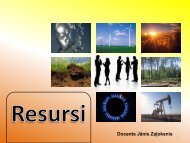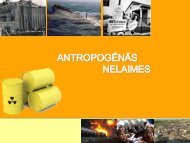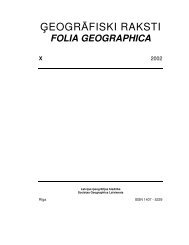eogrÄfiski raksti folia geographica xii - Ä¢eogrÄfijas un Zemes zinÄtņu ...
eogrÄfiski raksti folia geographica xii - Ä¢eogrÄfijas un Zemes zinÄtņu ...
eogrÄfiski raksti folia geographica xii - Ä¢eogrÄfijas un Zemes zinÄtņu ...
Create successful ePaper yourself
Turn your PDF publications into a flip-book with our unique Google optimized e-Paper software.
13<br />
GENERAL TRENDS<br />
narrow evaluation based on “international” scientific databases can be conducted in some fields<br />
of science but it does not suit well for geography, especially for human geography that has<br />
significant cultural and linguistic connections to the places it researches.<br />
A further challenge to geography is the European harmonization of <strong>un</strong>iversity curricula<br />
that is taking place. In general, to be more integrated, it is expected that scholars from co<strong>un</strong>tries<br />
of “small languages” should use English more often in their teaching and publications as well as<br />
in references. In the Baltic States the departments of geography are quite small and the research<br />
<strong>un</strong>its are smaller still when geography is split into sub-<strong>un</strong>its. The further integration into EU<br />
research frameworks will raise the question in the three Baltic States, for example, whether<br />
there is a possibility or even a need for Ph.D. granting in the national language? If the language<br />
of science is English and geographers in the three Baltic States publish their research outcomes<br />
in English, what will be the future of geography and GRFG?<br />
The history of the institutionalization of geography indicates the broadening of<br />
geographers’ activities. Today in Latvia these reach are over from classic f<strong>un</strong>damental research,<br />
to applied research, and further into contracting and consulting activities. The two very<br />
specialized extremes of geography – the specialized scientist in the academy and the manager of<br />
international research framework programs – are represented by those geographers whose<br />
language is most often English. However, there is geography outside these extremes and a need<br />
to continue teaching and publishing in “small languages” such as Latvian.<br />
Integration of Latvia in the European Union will increase the number of geographers<br />
involved in contracting and consulting fields. There is need for particular <strong>geographica</strong>l<br />
knowledge in the territorial organization and regional development policy in Latvia. In my brief<br />
enco<strong>un</strong>ters with Latvian policy makers I have noted that there exists mis<strong>un</strong>derstanding<br />
concerning regional development, regional policy, and the EU Structural F<strong>un</strong>ds. This is at least<br />
partly so because there is not enough conceptualization of the region and regional development<br />
theories – major concepts in Geography – in the Latvian language and in Latvian contexts.<br />
Furthermore, in Latvian as in many other languages, the <strong>geographica</strong>l vocabulary is place and<br />
context sensitive. Many specific <strong>geographica</strong>l words in Latvian do not translate very easily and<br />
directly into English. I observed this when discussing with Latvians nuances of different<br />
landscape types in a seminar (2002) in Estonia. Local linguistic usages and one’s mother tongue<br />
are very important in grasping sensitive geographic nuances. For scientific and applied research<br />
and their implementation it is important to know the concepts, terminology, and theories<br />
profo<strong>un</strong>dly also in one’s mother tongue. Nevertheless, because in the world most <strong>geographica</strong>l<br />
literature is written in languages than other Latvian, there is also a need to know other<br />
languages, and I would recommend at least English, Russian, German, and one Romanic<br />
language. This makes it possible for geographers of small co<strong>un</strong>tries to follow many fields and<br />
develop ideas in one’s mother tongue as well as in a foreign language.<br />
Today in Latvia, besides GRFG, there are other geography-related publications in the<br />
Academy of Sciences and at the University of Latvia as well as at sub-branches of the<br />
University and in several research institutes and organizations of public authorities. Ministries<br />
and other authorities publish research papers by geographers, but they do not have a particular<br />
journal devoted to <strong>geographica</strong>l issues. GRFG is globally the most significant journal for<br />
geography in Latvian.<br />
My recommendation for GRFG is that it should remain a <strong>geographica</strong>l journal about<br />
Latvia. It should contain viewpoints from both human and physical geography. My suggestion<br />
is that all articles should be in Latvian with tables and figure texts in Latvian and English and a<br />
full-page summary in English. I think that many aspects of <strong>geographica</strong>l research are best<br />
expressed in the mother tongue. For Latvians there are plenty of opport<strong>un</strong>ities to publish in<br />
English elsewhere. I also suggest writing also reviews in Latvian about different significant<br />
<strong>geographica</strong>l concepts and theories – maybe a couple of articles in each journal issue. In a few<br />
years this would become an invaluable reference for students, scholars and policy makers in<br />
Latvia. A final recommendation is that the journal would be accessible on the Internet – even<br />
the journals from the 1920s and 1930s.<br />
GRFG has an important mission. GRFG is globally a <strong>un</strong>ique arena in which there is<br />
published <strong>geographica</strong>l research in Latvian. The articles create a very significant patrimony in


